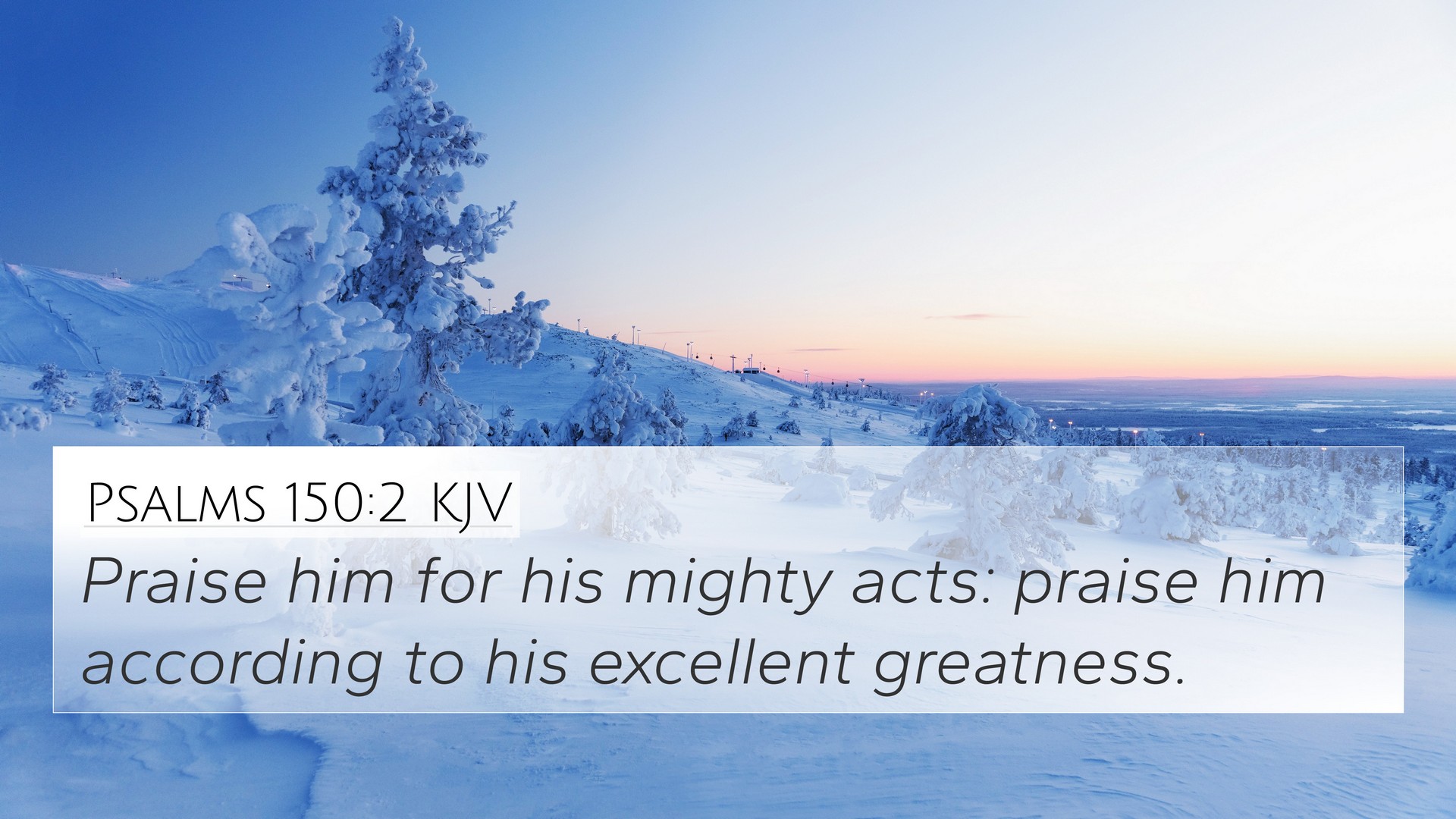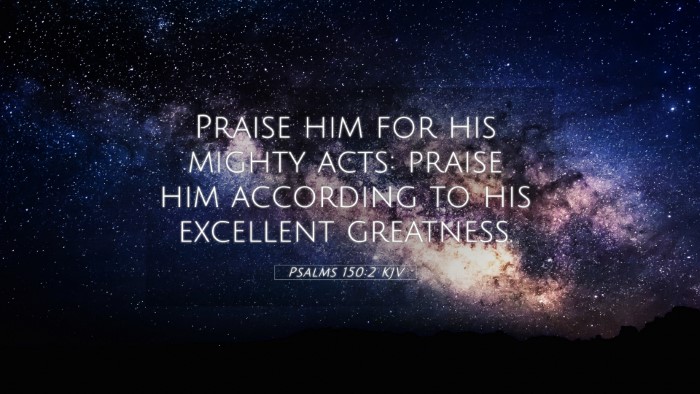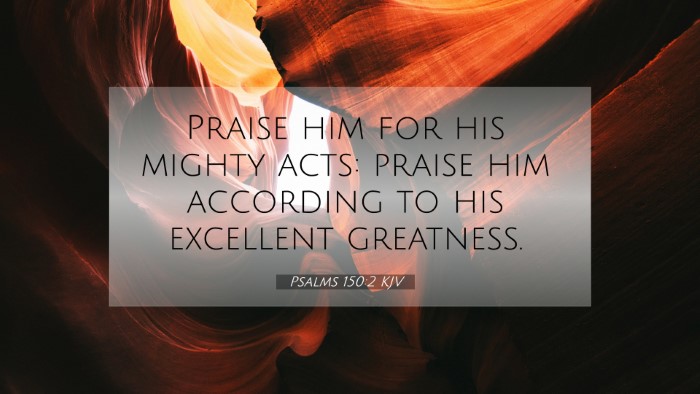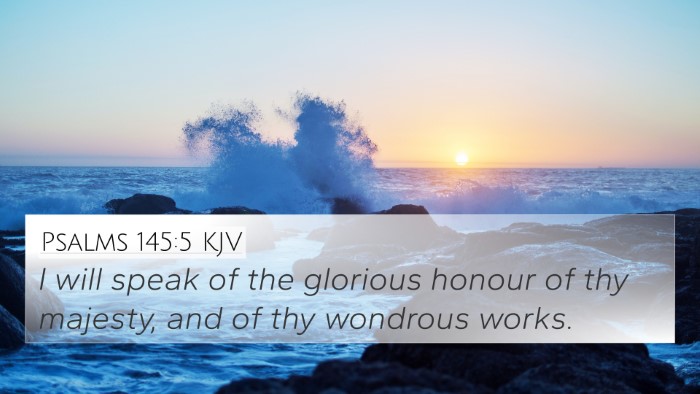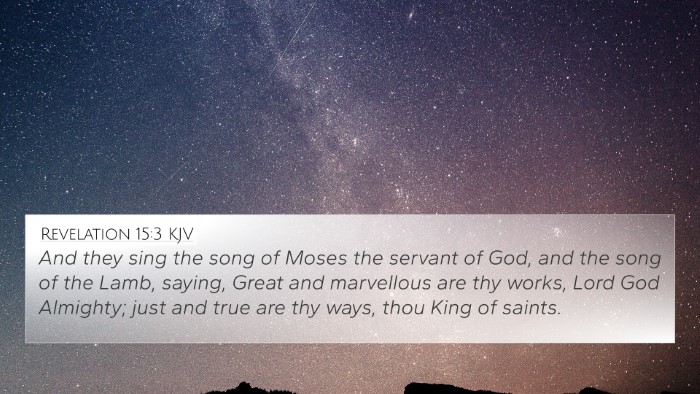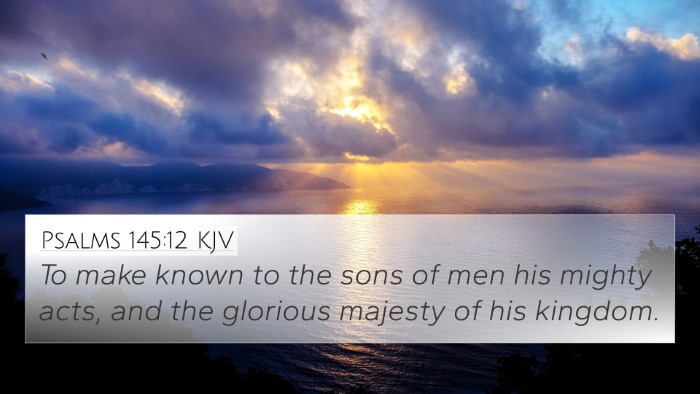Understanding Psalms 150:2
Psalms 150:2 states: "Praise him for his mighty acts; praise him according to his excellent greatness."
This verse encapsulates the essence of worship, calling believers to acknowledge God’s power and majesty.
Summary of Key Insights
- Nature of Praise: The psalmist urges to praise God for His works and great attributes, indicating that both His actions and nature deserve recognition.
- Mighty Acts: Alluding to God’s incredible works, including Creation, miracles, and providential actions throughout history.
- Excellent Greatness: Referring to God's supreme and unparalleled nature which exceeds all understanding and comparison.
Combined Insights from Public Domain Commentaries
Here’s a synthesis of interpretations from Matthew Henry, Albert Barnes, and Adam Clarke:
Matthew Henry's Commentary
Henry emphasizes the complete aspect of praise, suggesting that it should come from a place of reverence and joy. He notes that the focus on both mighty acts and greatness encourages a holistic worship experience that recognizes not only what God does but who He is.
Albert Barnes' Commentary
Barnes highlights the imperative nature of the command to praise, portraying praise as an essential duty of every believer. He asserts that true appreciation of God's majestic works leads to both personal and communal worship that uplifts the soul and elevates God's glory.
Adam Clarke's Commentary
Clarke provides insights on the different dimensions of praising God, suggesting that acknowledging His greatness involves understanding and recounting the many ways God has demonstrated His power, including creation and salvation. He challenges believers to let their praise be proportional to the magnificence of God’s character and actions.
Cross-References for Psalms 150:2
The following Bible verses are connected thematically or contextually to Psalms 150:2:
- Psalms 145:5: "They shall speak of the might of your awesome deeds, and I will declare your greatness."
- Psalms 104:1: "Bless the Lord, O my soul. O Lord my God, you are very great!"
- Isaiah 12:5: "Sing to the Lord, for he has done glorious things; let this be known to all the world."
- Revelation 5:12: "Worthy is the Lamb who was slain, to receive power and wealth and wisdom and strength and honor and glory and praise!"
- Psalms 96:4: "For great is the Lord and most worthy of praise; he is to be feared above all gods."
- Psalms 149:1: "Praise the Lord! Sing to the Lord a new song, His praise in the assembly of the faithful."
- 1 Chronicles 16:29: "Ascribe to the Lord the glory due his name; bring an offering and come before him. Worship the Lord in the splendor of his holiness."
Thematic Connections
Psalms 150:2 serves as a further connection point in biblical studies, where themes of God’s greatness and works are often explored. Thematically, the verse links back to several important concepts in scriptural dialogue:
- Worship as Response: A common theme is the human response to witnessing God’s actions and character.
- Creation and Praise: Many verses illustrate a direct connection between recognizing God's creation and an outpouring of praise.
- Community in Worship: The call to communal praise reflects various biblical texts encouraging and depicting collective worship.
Practical Applications
In light of the insights from Psalms 150:2, believers are encouraged to:
- Engage in Worship: Actively participate in both personal and communal worship experiences that focus on God’s attributes.
- Reflect on God's Works: Take time to meditate on and recall the mighty acts of God, both in personal lives and scripture.
- Discover Cross-References: Utilize tools for Bible cross-referencing to explore connections between this and other verses, enriching one's understanding of scripture.
Conclusion
Psalms 150:2 remains a powerful reminder of the necessity and joy of praising God for His mighty deeds and His greatness. By understanding this verse in light of both scripture and commentary, believers are equipped to deepen their worship experience and appreciate the interconnections within the Bible.
This verse serves as a springboard for further study, encouraging a comprehensive approach to Bible verses that relate to each other and fostering a richer understanding of the biblical narrative through cross-referencing.
